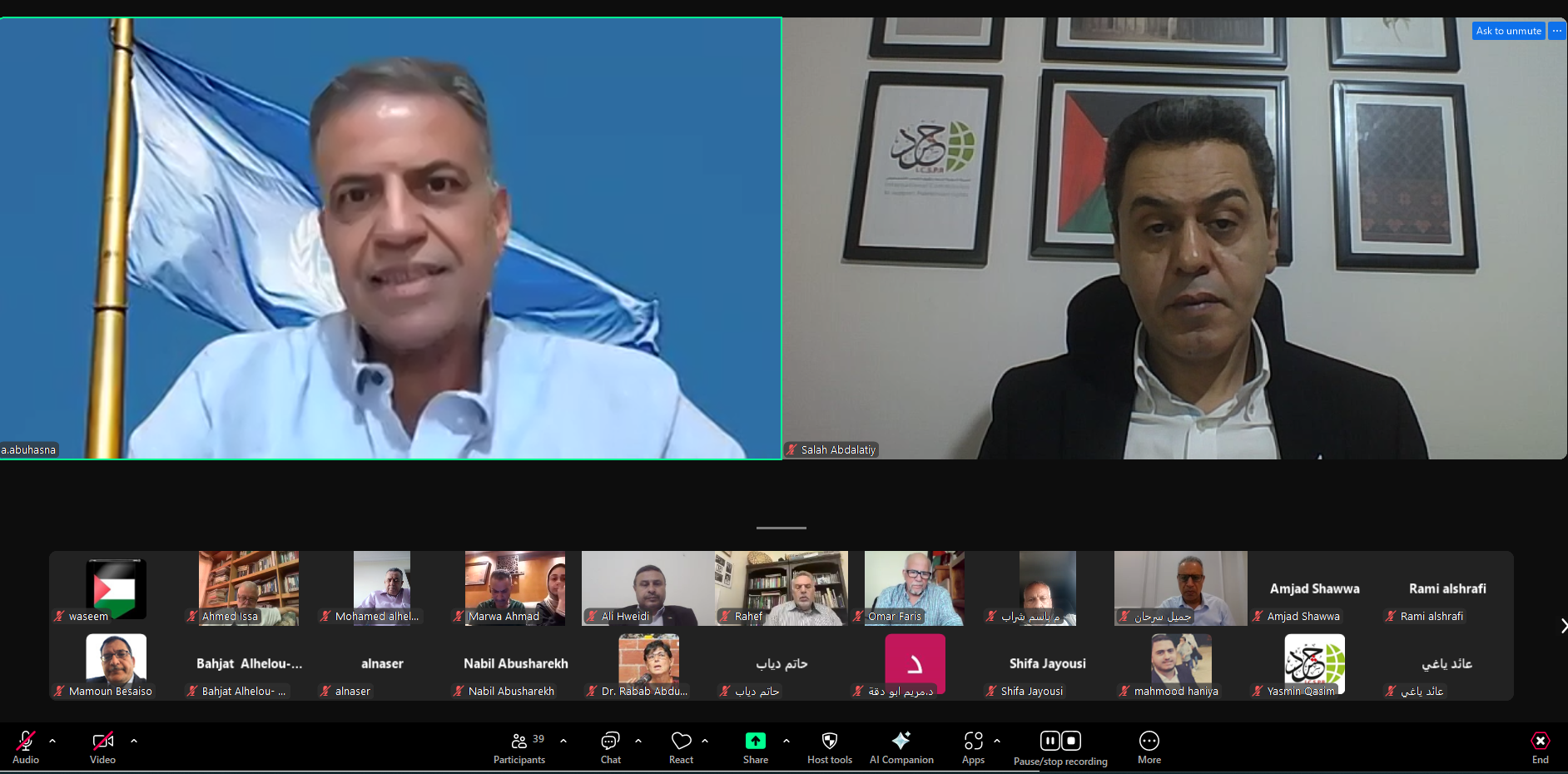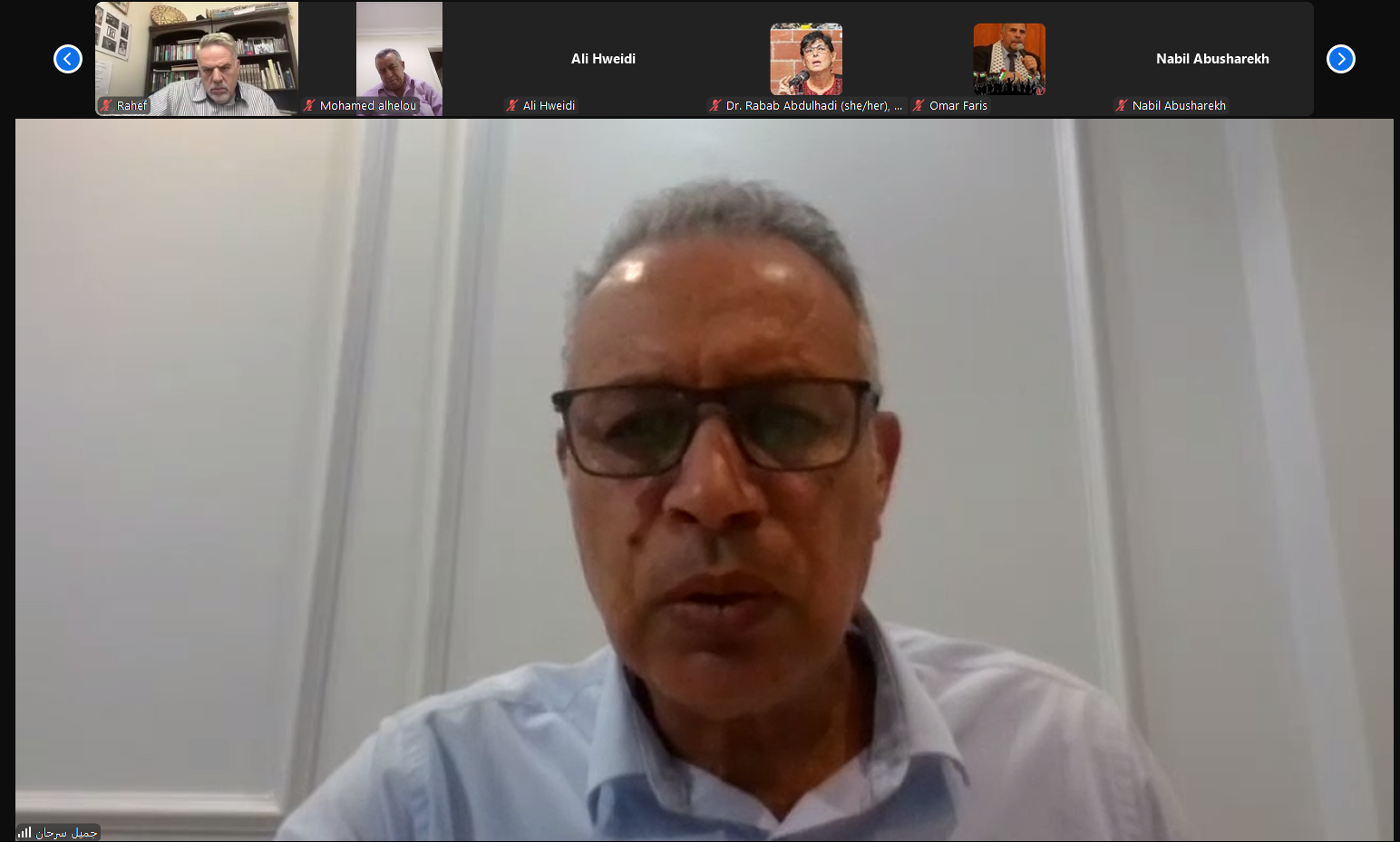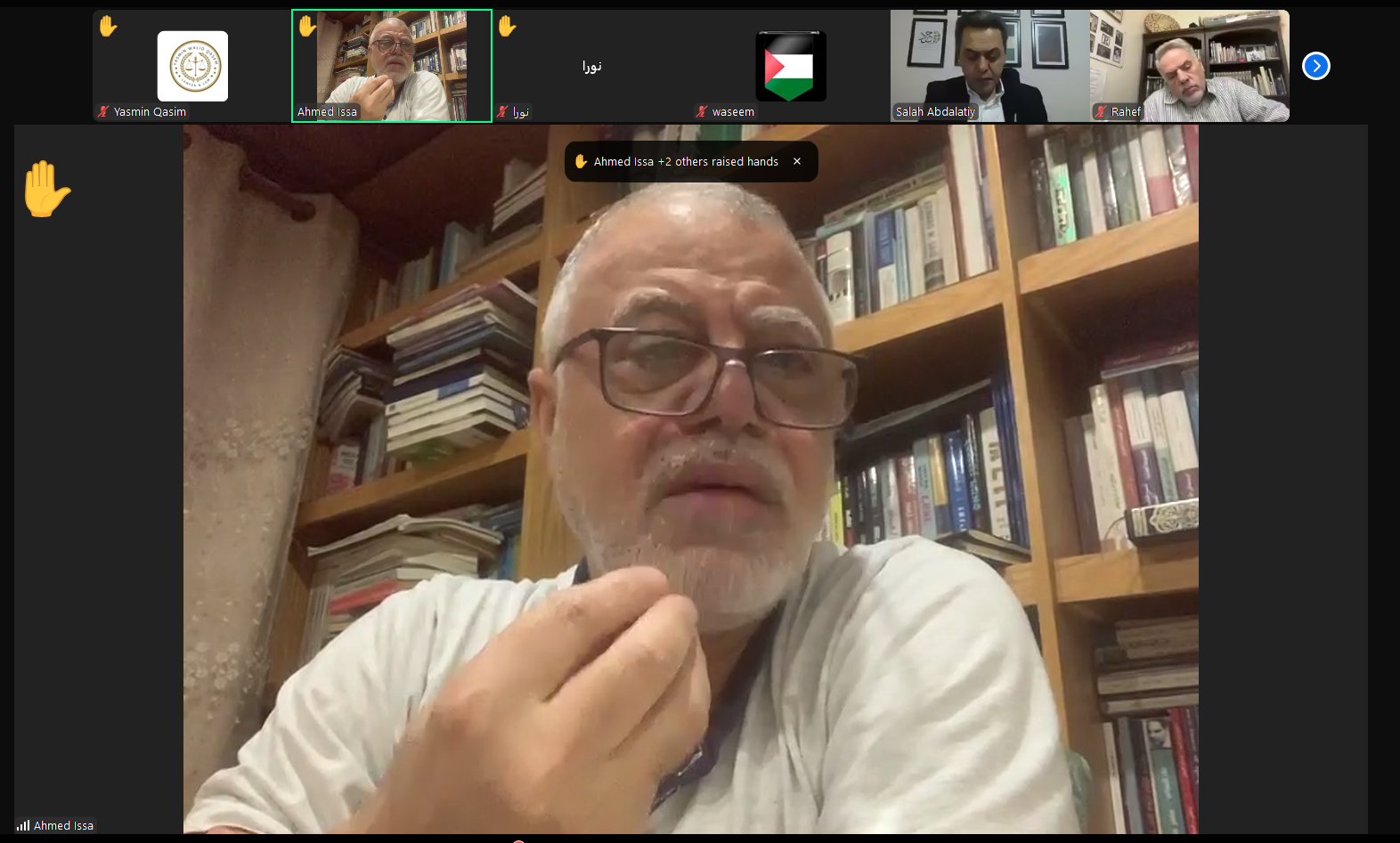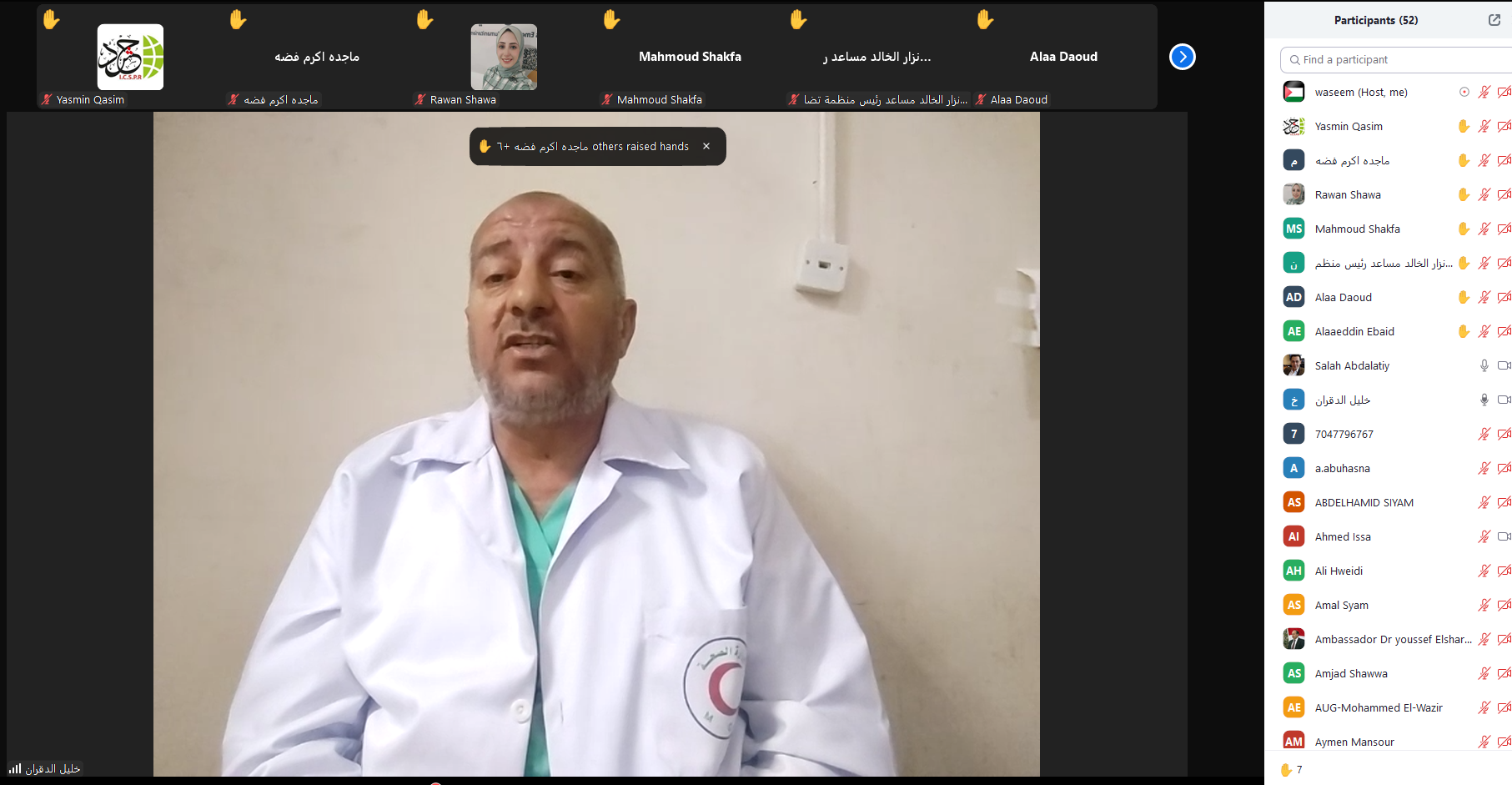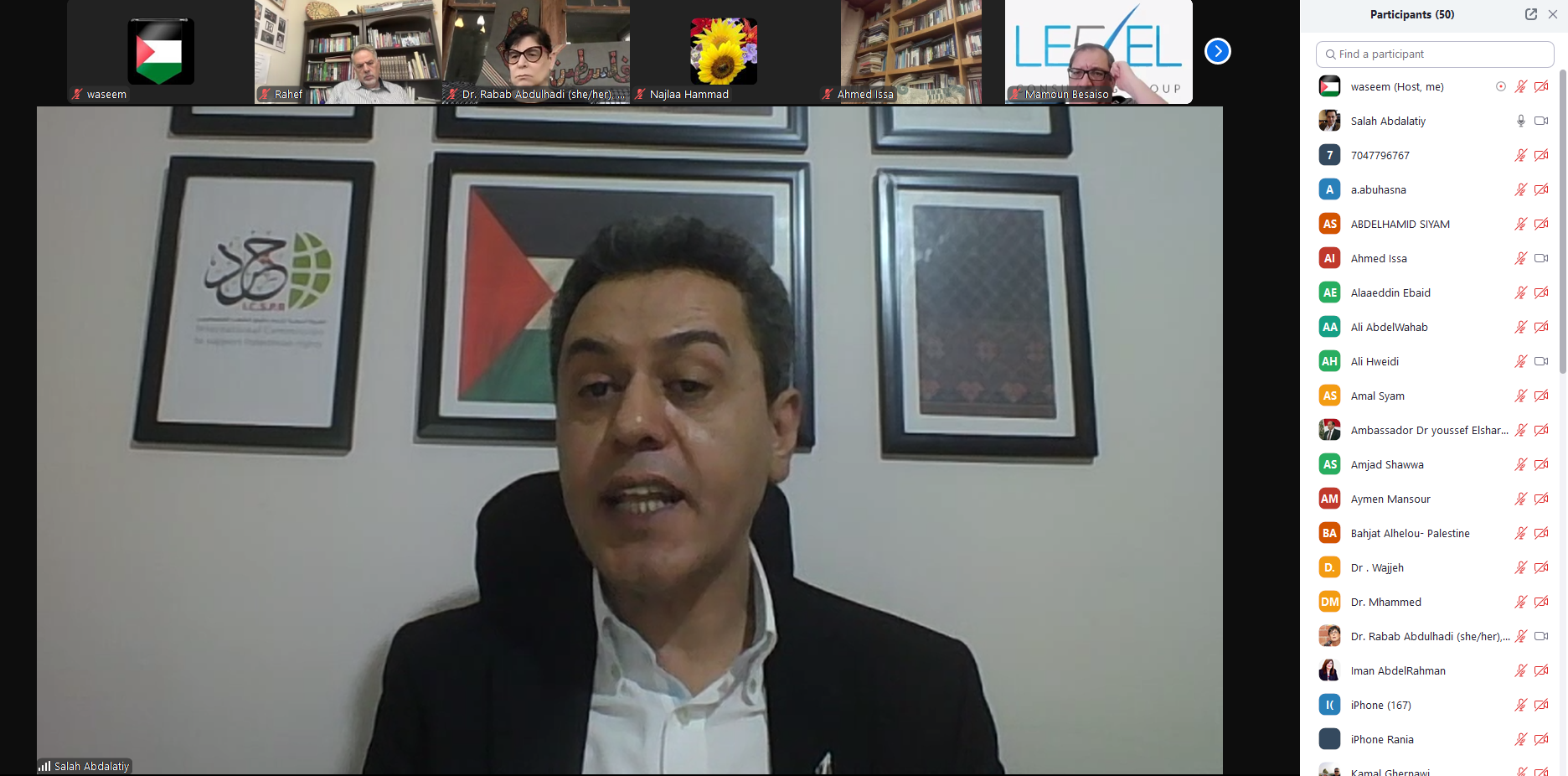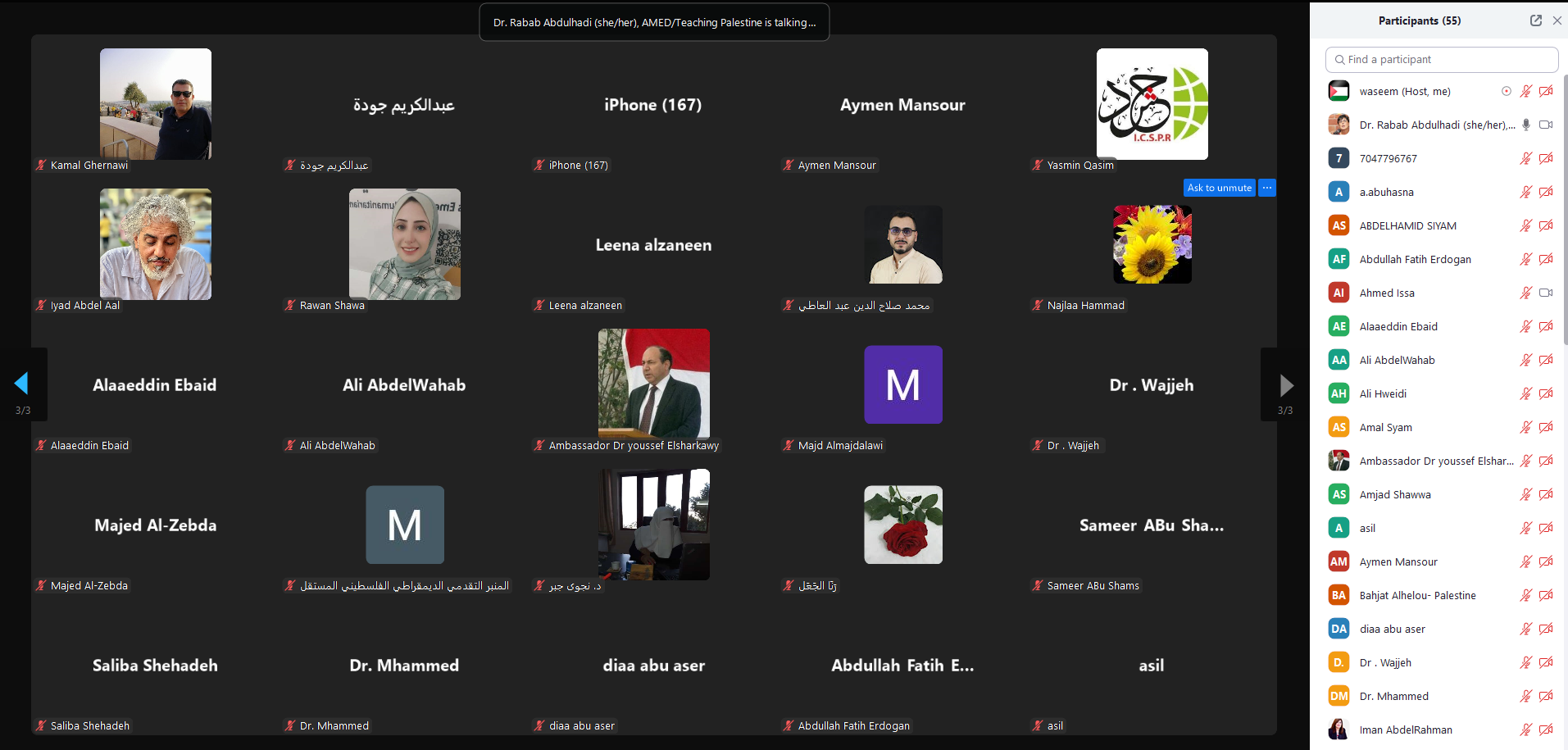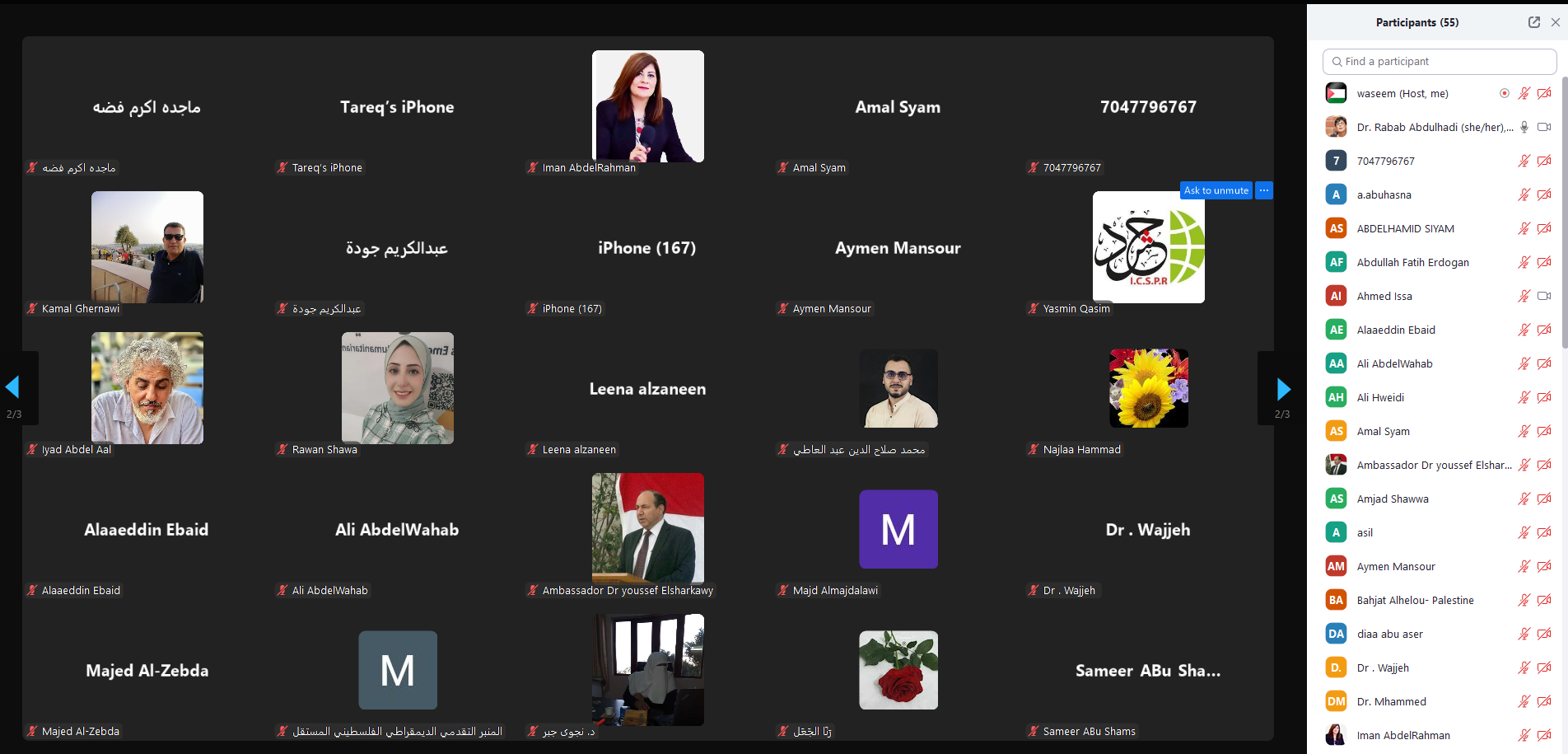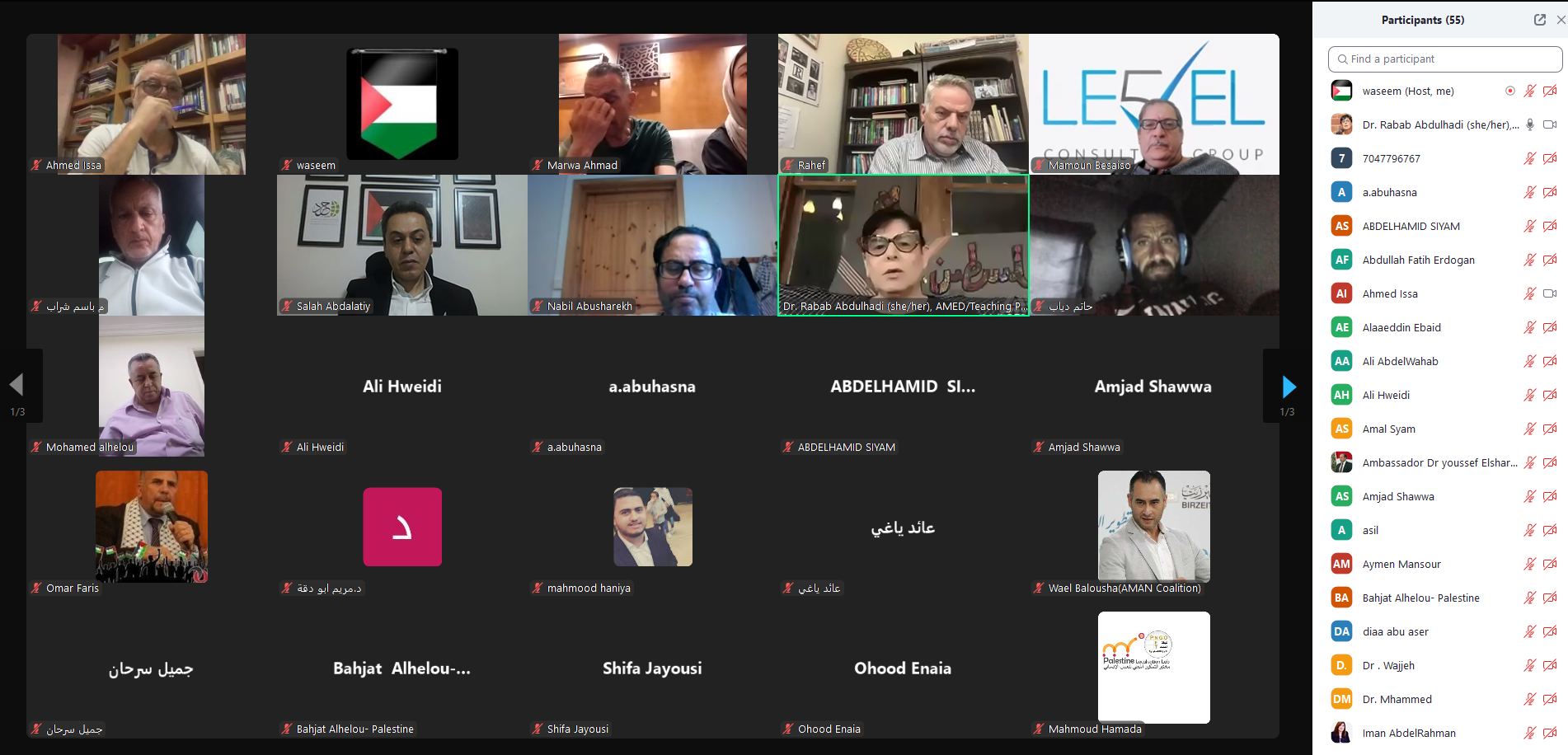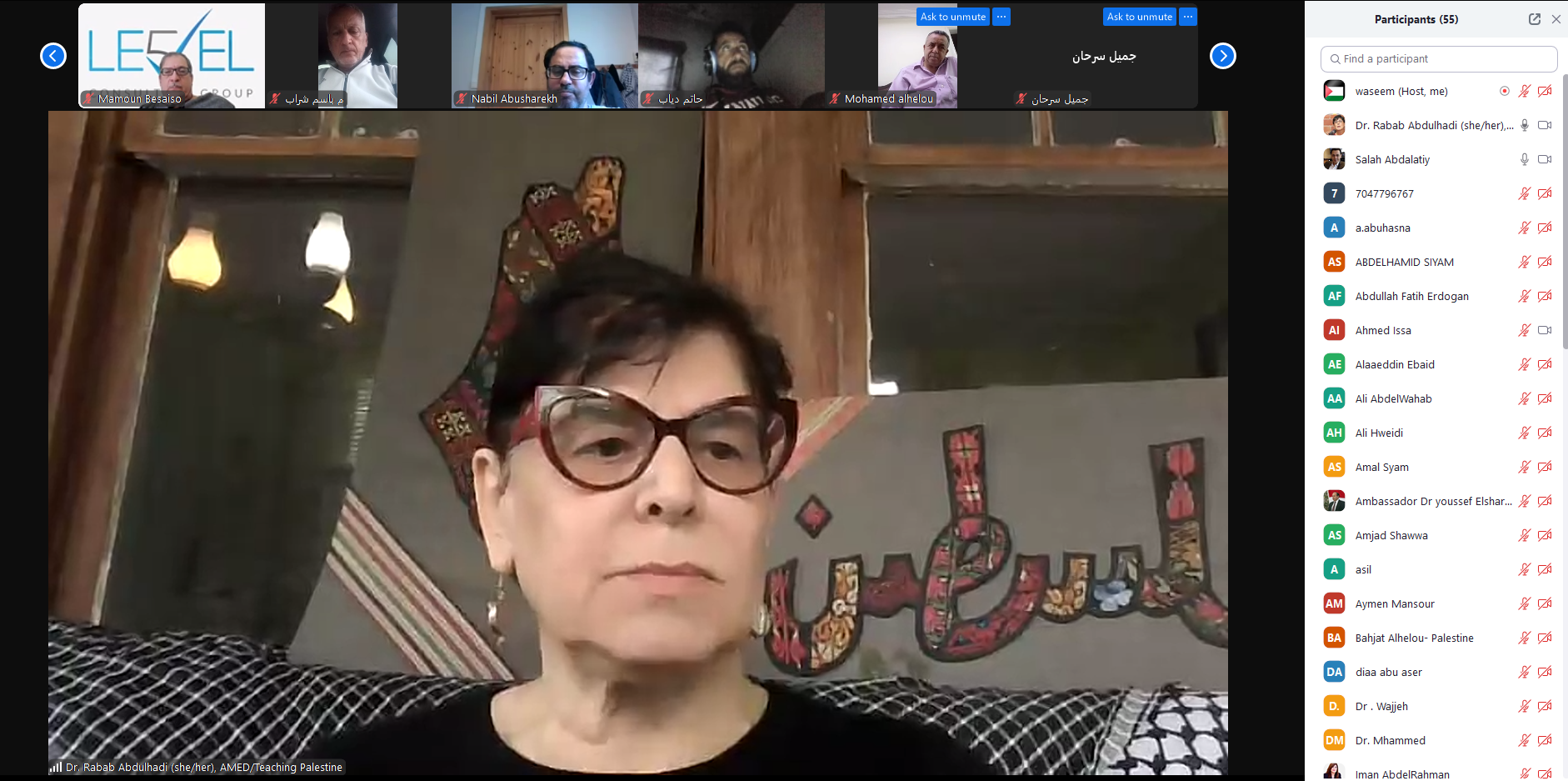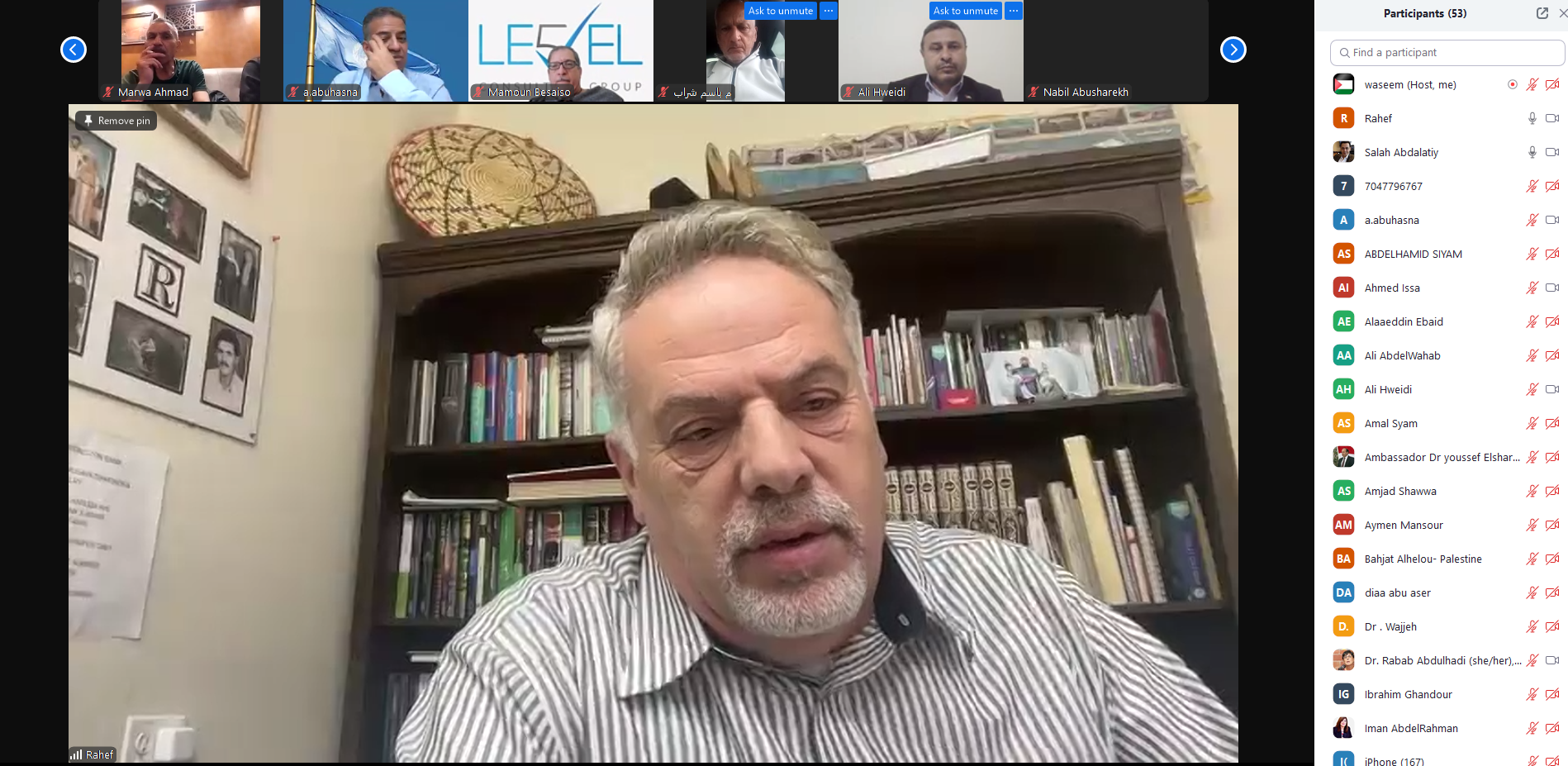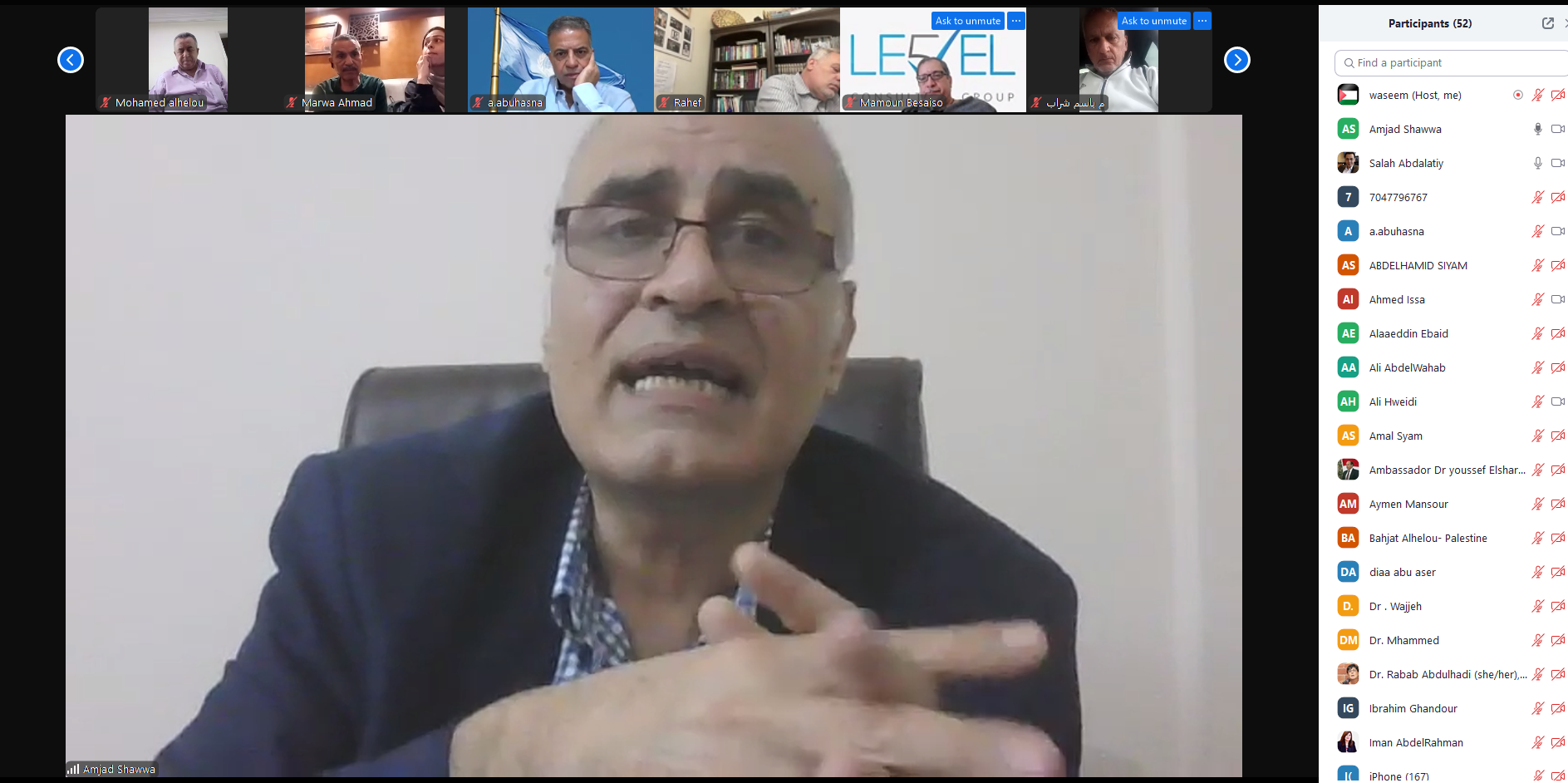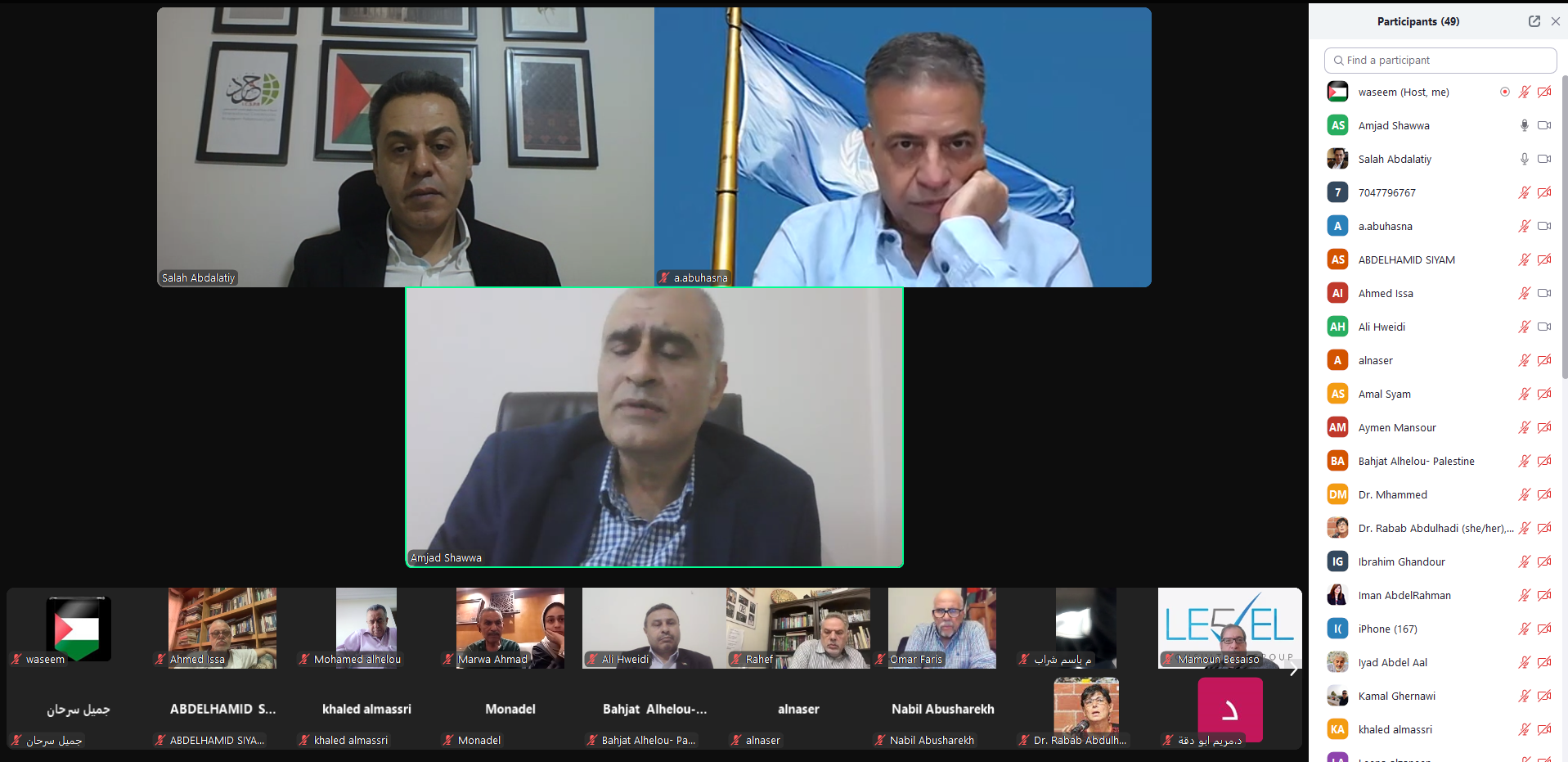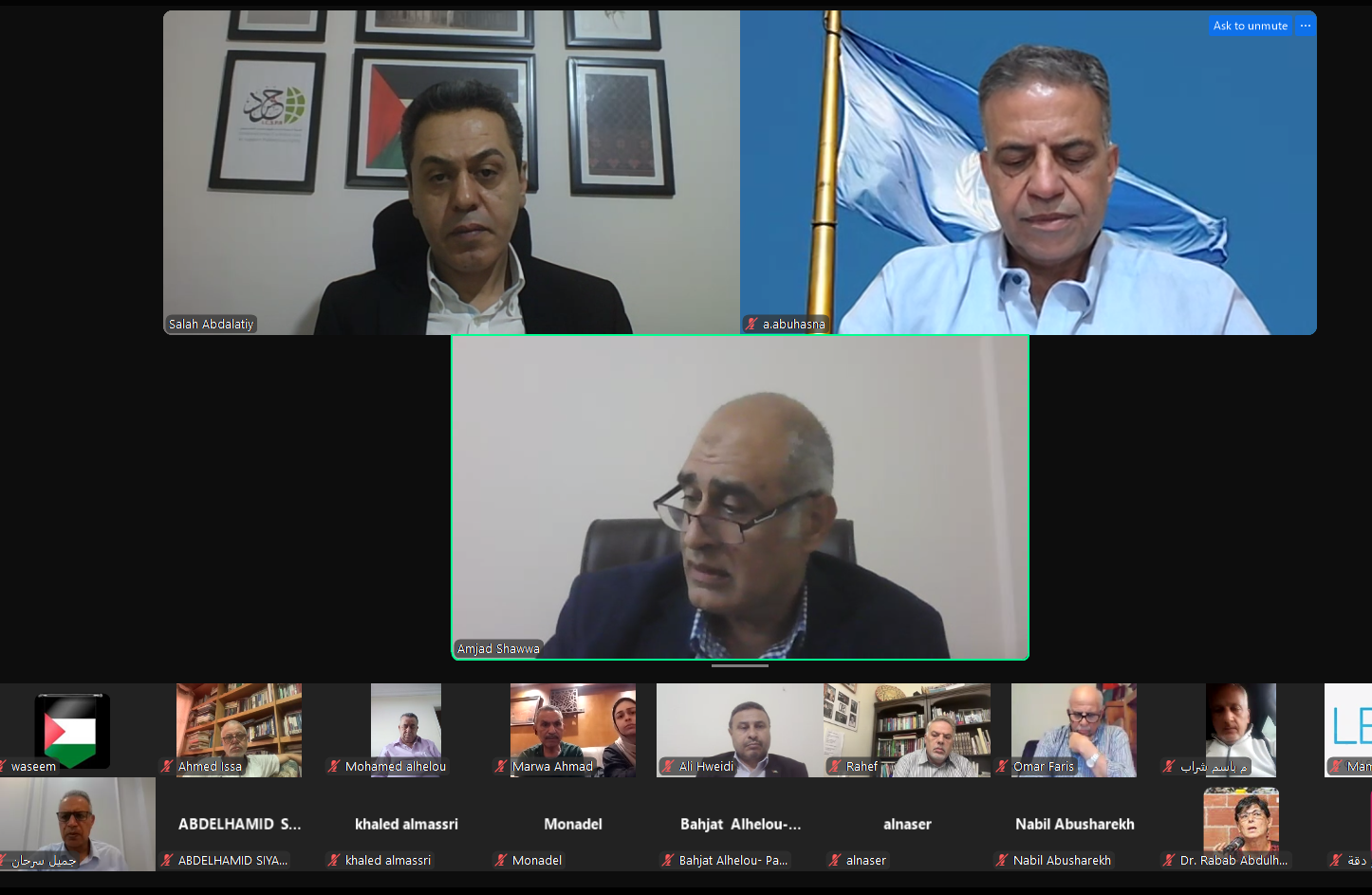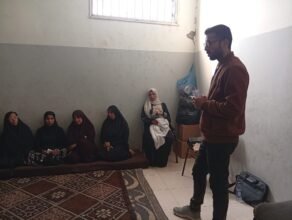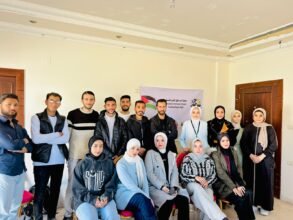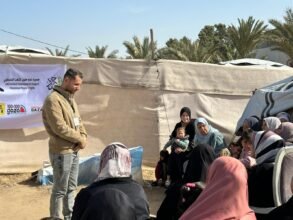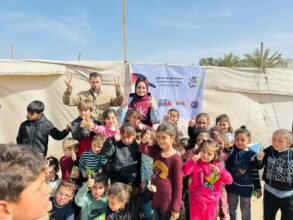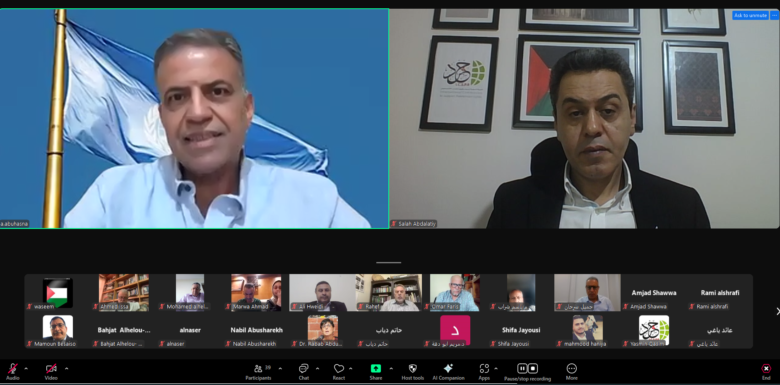
The International Commission “ICSPR” Holds a Dialogue Meeting Titled: Dimensions and Implications of the American Aid Plan in the Gaza Strip
Date: 14-5-2025
Time of the meeting: 7:00 PM Jerusalem Time
Venue of the workshop: Zoom Application
Press Release
The International Commission “ICSPR” Holds a Dialogue Meeting Titled: Dimensions and Implications of the American Aid Plan in the Gaza Strip
The International Commission to Support the Palestinian People’s Rights “ICSPR” held this evening a dialogue meeting through a virtual seminar organized in cooperation with the Palestinian Communities Network in Washington and the Center for Political and Development Studies, entitled (Dimensions and Implications of the American Aid Plan in Gaza), with the participation of political and intellectual figures from inside and outside.
This meeting came with the aim of launching an international campaign by Palestinian, Arab, and international parties to stop the genocide war and ensure the flow of aid to the residents of the Gaza Strip and to oppose the proposed American-Israeli plan to manage aid in the Gaza Strip, which aims to replace alternative parties for the United Nations Relief and Works Agency for Palestine Refugees (UNRWA) and other international and civil entities, militarize humanitarian work and use it as a weapon amid warnings of serious humanitarian repercussions threatening the population of the Gaza Strip, especially the Rafah area, with systematic consequences to displace the population of the Gaza Strip.
The meeting was opened by Lawyer Dr. Salah Abdel-Ati, Chairman of the International Commission to Support the Palestinian People’s Rights, welcoming the guests and participants in the dialogue meeting, stressing the importance of this meeting in raising awareness and highlighting the risks and implications of the American-Israeli plan, which is presented under a false humanitarian cover. He emphasized the need to expose these policies that pave the way for engineering the blockade, famine, and humanitarian catastrophe and pushing the population to forced displacement under the pressure of hunger and bombardment, calling for opposition to the American plan and confronting its catastrophic outcomes.
Abdel-Ati considered this plan to rise to the level of an international crime that contradicts humanitarian principles and the rules of international humanitarian law, stressing that it aims to impose a reality of starvation and displacement and is being used to undermine UNRWA under the pretext of lack of neutrality. He stressed that the plan legitimizes genocide and deprives Palestinians of their basic rights such as the right to health, education, and infrastructure, unlike UNRWA, which provided all services and ensured their delivery to all Palestinian groups. He also accused the United States of being a partner in this genocide through its coordination with Israel despite America’s repeated denials of these coordinations. He warned of a complete collapse of the living situation and called for an international alliance to force the occupation to open urgent humanitarian corridors to save Gaza and prevent the implementation of these policies that contradict international law and constitute “genocide engineering,” not a solution to the humanitarian crisis in Gaza.
In turn, UNRWA media advisor Mr. Adnan Abu Hasna revealed the absolute rejection by UN organizations of the American plan, which he described as “an attempt to dismantle UNRWA and replace it with local entities and temporary projects of a security nature,” indicating that UNRWA includes more than 13,000 employees, hundreds of institutions, and thousands of contractors, which makes its replacement impossible. He revealed the content of the American proposal, which consists of 30 pages, including the establishment of an aid distribution institution according to strict security conditions, including 4 points in the southern Gaza Strip, each serving 300,000 Palestinians and subject to security checks in exchange for a food meal not exceeding 1,400 calories, controlling type and quantity. He also indicated that the implementation of this process will be done through security companies without any guarantees to protect the beneficiaries and forcing the population to forced displacement, warning of a dangerous precedent that contradicts the principles of the United Nations, which refuses to be a partner in discrimination in the distribution of food and healthcare.
Abu Hasna confirmed that the position of international organizations, including UNRWA, the World Food Programme, and UNICEF, was unified and rejecting this plan whether in Security Council meetings or the United Nations. Abu Hasna also pointed to the tragic situation in the Gaza Strip due to the policy of starvation, thirst, and deterioration of the humanitarian situation and the rise in malnutrition rates among citizens.
He praised the resilience of the residents of the Gaza Strip despite hunger and the catastrophic situation and their ability to reject and thwart this plan, which falls under the framework of humanitarian aid.
For his part, Mr. Amjad Al-Shawa, Director of the Network of NGOs, described the plan as “humanitarian bubbles,” stressing that it aims to starve the population and forcibly displace them to the south of the Gaza Strip through a strict security system managed in coordination with the Israeli occupation and private security companies. He pointed out that the plan reintroduces previously rejected ideas and is currently managed in coordination with the Israeli army and American companies. It is clear that it targets 50% of the population in its first stage, which means starving the other half and exposing them to killing in the absence of any guarantees to protect civilians. He also warned of the actual implementation of the plan in the “Morag” corridor. He criticized the limited aid, which is restricted in type and quantity, by allowing only 100 aid trucks compared to what used to enter during the truce period (600) trucks daily, and it is insufficient in terms of quantity, as it includes meals with limited calories. The plan also did not address other aids such as medical aid, fuel, tents, and mobile homes from the essential aid. He confirmed the unified official Palestinian position to reject this plan, starting from the government and factions to NGOs, the private sector, and clans.
Mr. Raheef, head of the Palestinian Community Union in America, addressed a stable reading of the American aid plan in the Gaza Strip, which has a clear and systematic vision. He explained that America sees that Israel is unable to resolve this war and end the battle militarily and considered that the aid plan would be more decisive. Raheef denounced the US administration’s implementation of plans to help the occupation evade ending the war, and it should have called for stopping the genocide in the Gaza Strip and ending the ongoing massacres and violations. He added that America is nothing but an actual partner in it.
The US administration contributes to supporting the occupation financially and militarily through funding and supplying it with weapons even before proposing the aid plan, which he saw as just a project being pushed to serve the Israeli people through the displacement of Palestinians. In his intervention, he pointed to the activities of the community and its provision of the necessary financial support and aid to the residents of the Gaza Strip, as well as political support through asserting their presence in alliances with American forces. He denounced Trump’s lifting of sanctions on Syria while allowing Israel to legalize killing and destruction, and therefore the US administration should have stopped the war immediately and not presented a circumvention plan to appear to the world as concerned with a solution.
In the same context, Palestinian academic in America Dr. Rabab Abdulhadi warned against turning the Palestinian cause into merely a “humanitarian crisis” managed by aid instead of recognizing the national and political rights of Palestinians and concealing the genocide under the title of “famine management.” She confirmed that the United States has always used food as a tool of domination and praised the growing student movement inside American universities from sit-ins and hunger strikes in solidarity with Gaza and rejection of these policies. She confirmed that students have paid a heavy price for their positions in the form of arrests, loss of scholarships, and job opportunities. She pointed to Trump’s visit to the Arab region, considering it merely an attempt to calm the angry atmosphere inside America due to his absolute support and bias towards Israel. In her intervention, she noted that the Palestinian people and their will are what will foil the American narrative, while the position of the Palestinian Authority embarrasses American supporters due to its dealings with the occupation.
The participants’ interventions revealed the existence of strategic plan contents with political objectives directly targeting the liquidation of the work of the United Nations Relief and Works Agency for Palestine Refugees “UNRWA” within a joint American-Israeli vision seeking to undermine the agency’s role in the Gaza Strip.
Participants also directed sharp criticism at attempts to polish the American role and portray it as humanitarian intervention to save the population from famine, while in fact, it aims to displace the population of the Gaza Strip and dismantle UNRWA and its basic services, which poses a direct threat to the future of Palestinian refugees and undermines international institutions supporting refugee rights.
Dr. Mariam Abu Daqa stressed that the plan seeks to distort UNRWA, which stands as a witness to the Nakba, and that attempts to replace it are not new but are now passing with direct American support through weapon funding and veto usage. She described the plan as a political-economic project aimed at controlling the Gaza Strip and its resources, especially gas. She pointed out that Trump sees the Gaza Strip as a profitable project while refusing to oblige Israel to any international commitments because he is an actual partner in the war. She praised the steadfastness of the Palestinian people and their rejection of the plan and pointed to the failure of international law in protecting the vulnerable and the double standards in applying the law.
In an important intervention by Dr. Khalil Al-Daqran, spokesperson for Al-Aqsa Martyrs Hospital – Gaza, he described the catastrophic state of the healthcare system in the Gaza Strip, which is undergoing systematic genocide. He highlighted that Gaza is experiencing one of the worst humanitarian disasters in history amid a fierce campaign under the ongoing genocide war led by the Israeli occupation and its army against civilians, which so far has resulted in more than 52,000 martyrs and 120,000 injured. It has documented the martyrdom of 17,000 children, and more than 650,000 children are at risk of death due to hunger, lack of treatment, and unavailability of vaccines. He pointed out that the occupation has violated all international agreements and international humanitarian law regarding the protection of civilian objects, causing destruction and putting about 70% of hospitals out of service. During his intervention, he spoke about the rising famine cases among Gaza residents, the increasing rates of malnutrition, anemia, and severe dehydration among children and pregnant women, and the inability of medical teams to provide even the minimum level of healthcare services due to a shortage of medicines, fuel depletion, continued closure of crossings, and the denial of citizens’ access to treatment and clean water. He pointed out the difficulty of providing food and IV solutions to patients inside hospital corridors and the severe shortage of medical equipment, which portends a humanitarian catastrophe that may cost us many victims.
Mr. Omar Fares, a Palestinian activist in Poland, also pointed to the prominent role his association plays in organizing popular movements in Europe, where about 36,000 demonstrations in support of Palestine have been recorded during the past period. He considered this movement as one of the effective forms of popular pressure on decision-makers and criticized the absence of an official role by the Palestinian Authority, questioning the reason behind the absence of any Palestinian delegation participating in international meetings between institutions and international organizations to expose what the Palestinian people are subjected to and to mobilize support to stop the genocide. He also expressed his strong condemnation of the Saudi role, criticizing the reception of Trump and providing him with funding while the Kingdom has not provided any actual support or serious stance to stop the genocide. In the context of field movement, Mr. Omar announced the readiness of international groups to participate in a major movement on June 12 towards the Rafah crossing to break the siege, pointing out that thousands will set out as part of extensive coordination with ambassadors and diplomats from around the world.
Mr. Jamil Sarhan – General Director of the Independent Commission for Human Rights – raised during his intervention a fundamental question about how an area inhabited by millions of Palestinians can be declared a “famine zone,” while in reality this declaration is being rejected by donor entities due to its inconsistency with distribution standards and humanitarian neutrality. He confirmed that civil society, the women’s movement in Gaza, and both international and local entities all reject this mechanism as it does not achieve justice nor reach the actual beneficiaries. He pointed out that the Palestinian grassroots and national level is united in its complete rejection of this plan, asserting its impossibility of implementation on the ground due to the complexity of security corridors and the humiliating inspections faced by citizens, and the risks of death and arrests during movement. He also explained that the funding agencies themselves have refused to fund this plan because it clearly violates humanitarian principles, as it imposes specific distribution points managed by the Israeli army. He went on to say that the utter failure to implement the floating port project, which began at the end of 2023 and early 2024, only confirms the futility of these projects and the Palestinians’ rejection of them. He concluded his intervention by emphasizing that aid is a guaranteed right under international laws and charters, but the American plan in all its dimensions is rejected and should be implemented through international NGOs, led by UNRWA.
Mr. Nizar Al-Khaled, Assistant President of the Solidarity Organization for the Peoples of France, began his intervention by emphasizing the importance of raising this catastrophic plan and the dangerous dimensions it carries. He pointed out the difficulty of the existence of any region on Earth suffering from this level of destruction and tragedy amid a total Arab absence. He blamed Arab leaderships and governments for their failure to provide any actual support to the Palestinian health sector despite the health disaster Gaza is experiencing. He expressed his dissatisfaction with the silent Arab stance and declared his full solidarity with the Palestinian people in this great ordeal.
Ms. Amal Siyam – Gaza, indicated the seriousness of this plan and its implications, noting that this issue has already been discussed with several international organizations that expressed deep concern about the plan’s implications for humanitarian work standards. During her intervention, she explained that women’s organizations found that the proposed system systematically excludes civil society organizations, marginalizes the role of UNRWA and UN agencies, and contradicts the principle of neutrality and justice. She considered the aid distribution mechanism nothing but a trap that could expose beneficiaries to direct danger from occupation forces, especially women, children, and people with disabilities, and the difficulty they would face in accessing the aid due to security and geographical complications. She stressed that the basic criterion is the distribution mechanism and ensuring its ease, warning of the plan’s goal, which includes diverting attention from the genocide to focus only on famine, contributing to reshaping the narrative to portray Gaza merely as a region in need of aid rather than focusing on ending the war. She also criticized what she described as attempts to control the fate of the population by denying them self-sufficiency or a life of dignity.
Mr. Bassam Sharab confirmed that what is happening in the Gaza Strip is total genocide, not just a humanitarian crisis aiming to turn Gaza into a society living on minimal food without education, healthcare, or shelter, stripping it of the features of human life. He pointed out that the American plan is nothing but a prelude to forced displacement that essentially aims to empty Gaza of its population.
Ms. Nora Zaqout – researcher in the field of human rights and psychological support (Gaza), during the meeting, referred to the suffering of the Palestinian people in Gaza since the beginning of the genocide. She pointed out the seriousness of this plan and its clear policy of forced displacement and confirmed that the occupation authorities are following a clear gradual policy in implementing their plans, starting with targeting hospitals and committing massacres amid international silence and the failure of all international laws to hold them accountable for repeated violations. She noted that they are observing the reactions of international communities, which have proven to be negative, only to repeat the cycle again, gradually escalating violations to reach the weapon of starvation. She praised the patience of the people in Gaza, who are now fighting all forms of death, and touched on the importance of every step taken to support and assist the people of Gaza and the need not to underestimate any act that contributes to stopping this genocide and ensuring the delivery of aid — from a single word to actual implementation.
Ms. Rawan Al-Shawa – Gaza, board member of the International Commission and an activist, spoke during the intervention about the American plan and its political, security, developmental, and field-related dimensions, which cannot be separated as they surround it from all angles. She explained the political dimension, which calls for linking aid without real involvement of local and international institutions, turning this aid into a means of pressure rather than a means of support. As for the developmental dimension, she sees that this vision lacks long-term strategy as it is purely relief-oriented and does not contribute to reconstruction and economic revival in Gaza. She concluded the field challenges by pointing out the difficulty of obtaining this aid and the associated security risks, as well as the danger of excluding credible local human rights organizations.
Dr. Ahmed Saleh described what is happening as a close alliance between the United States and the Zionist movement for the past 20 years. He added that the Zionist movement has long sought to ally with the White House as a pillar of international decision-making in the world. For this reason, the occupation authorities are always keen on aligning the American alliance with them to ensure the continuity of their operations and violations in the territories. He noted that no one should be surprised by the content of this American plan, as everyone knows that the essence of any American scheme is to support the occupier only, enabling it to take over the land and displace the Palestinian people.
Ms. Alaa Dawood – Gaza, confirmed the dimensions of the American plan and its impact on the educational system and the health sector. She pointed out the systematic destruction of educational infrastructure by the Israeli occupation, targeting schools and universities, depriving more than 280,000 students of their right to education for nearly two years. She also noted the near-total collapse of the healthcare system and severe shortages in medicines and treatments. She stressed that this plan includes no solutions or institutional support to revive these sectors and has excluded the role of UNRWA in the tasks it used to provide in all humanitarian fields. She described the danger of involving private companies in aid distribution and what this opens up in terms of privatization of services, which contradicts the principle of free care during wars and armed conflicts. She also addressed the risk this plan poses in clearly fragmenting the social fabric through exacerbating poverty and unemployment and changing the demographic structure, ultimately leading to forced displacement.
In an intervention from the heart of the Gaza Strip, Engineer Hani shared the suffering and tragedy experienced by the residents of the Gaza Strip. He spoke about the difficulty of life and the extent of the citizens’ pain and shock regarding the American plan that speaks of displacement and forced expulsion, and how it humiliates and degrades the people of Gaza. He pointed to America’s new lie, which falls within the same context as the previous lie about the American floating port, through which the US tried to beautify its image by bringing in medicine and food, only for the port to become a base for defense, kidnapping, and killing. He also spoke of his deep resentment at the Gulf countries’ support for Trump, hosting celebrations and offering millions while these same countries provided no assistance to a people being exterminated, burned, and killed through hunger and thirst. He concluded his remarks with deep sorrow over the repetition of the Palestinian Nakba scenario, of Arab countries promising to help the Palestinian people, and how their betrayal contributed to the loss of Palestinian land and the Gaza Strip, placing it under Egyptian administration. Now, the same fate is being repeated with the Gaza Strip under American administration.
Mr. Ahmad Issa pointed to the American plan and its serious and obvious consequences, describing it as a cornerstone of the comprehensive American plan. He considered the genocide to be one of its key pillars, directly linked to the declared goals that Israel failed to achieve through military force, which led to the use of a new weapon—hunger—to achieve these goals. He added that America’s “beautified” image is now changing. He emphasized that all the public disagreements in the media, such as verbal clashes and condemnations between Trump and Netanyahu, are merely theater and performance, and beneath them lies genuine and actual support for the implementation of the joint American-Israeli project using starvation as a tool to subjugate the Palestinian people and push them toward forced displacement.
During the intervention of Ms. Yasmine Qasem, a lawyer and human rights researcher with the “ICSPR”, she explained the consequences of this plan, which appears to be humanitarian to the world but carries within it dangerous political and security dimensions that threaten the future of the Gaza Strip and its right to self-determination. She stated that any plan presented under the guise of humanitarianism, if it does not arise from the approval and will of the Palestinian people, cannot be accepted. She emphasized that aid is a right, not a favor, and that neither the occupation nor the U.S. administration has the right to control the fate of two million people by placing them under a triangle of genocide—death by killing, hunger, or thirst. She rejected any plan proposed without the participation and representation of the legitimate representatives of the Palestinian people and condemned political and security projects that ignore Palestinian rights and treat them as beggars instead of people with a just cause. She warned of the dangers of implementing this plan, which could lead to a new Nakba in the 21st century, allowing Israel to continue its systematic policy of pushing the residents of the Gaza Strip towards Sinai and taking control of Gaza.
Other participants affirmed that the plan is based on three main objectives, all aiming at the gradual dismantling of UNRWA and replacing it with alternatives that serve specific political agendas. The plan seeks to cement forced displacement by gathering the residents of the Gaza Strip in Rafah, turning it into a “large prison.” It includes the entry of 60 relief trucks per day, not to address the humanitarian crisis, but as a pressure tool to push people toward migration. The plan aims to beautify the American role and present it as a savior from famine. They believe that a small portion of the money spent on Trump’s visit to the Gulf would be enough to re-fund and reactivate UNRWA.
During the meeting, participants commemorating the 77th anniversary of the Nakba of Palestine expressed their rejection of the American-Israeli plan for distributing aid, noting that the responsibility to stop the genocide and support the Gaza Strip lies with everyone: Arabs, the international community, and Palestinians. They stressed that the absence of political consensus and the weakening role of the Palestinian Authority has exacerbated the tragedy. They called on human rights defenders and media professionals to intensify documentation and advocacy efforts to stop the genocide and support the resilience of the people of Gaza and confront inhumane plans, foremost among them the American aid distribution plan. They urged for the full demand of Palestinian rights and the activation of the UN role to pressure Israel and hold it accountable for its committed crimes, especially amid its insistence on turning Gaza into a scene of starvation and genocide.
The recommendations of the participants in this meeting were distributed across four axes:
First: At the international and UN level
-
Demand an immediate and comprehensive halt to the genocide in the Gaza Strip and work on documenting the crimes and violations to ensure the prosecution of perpetrators before international courts.
-
Human rights institutions, organizations, and concerned states must pressure Israel to open humanitarian crossings, ensure the flow of urgent relief and medical aid, and allow fuel entry without obstacles or conditions. Also, to replace and cancel the ready-meal system with a variety of food materials that preserve the dignity of the citizen and their right to control their nutrition.
-
Call on human rights organizations and relevant institutions to activate urgent international protection mechanisms for Gaza, especially for medical facilities and civilian objects, based on the Geneva Conventions and their protocols and international treaties and laws.
-
Work to form an independent international humanitarian coalition to ensure aid delivery under community supervision away from political and security dimensions, and prevent it from becoming tools of control and humiliation.
-
Pressure the United Nations and international institutions to recognize the seriousness of this plan, condemn it, and confront all attempts to impose it as a fait accompli.
-
Establish an independent international investigation committee on the genocide crimes committed against the Palestinian people, including targeting hospitals and medical teams.
-
Work on activating Palestine’s observer membership in the United Nations and investing in international treaties to mobilize legal and rights-based support.
-
Call for urgent international action to ensure the functioning and continued funding of the UN Relief and Works Agency for Palestine Refugees (UNRWA), without conditions, as it is the lifeline for Palestinian refugees and the witness to the right of return.
-
Reject replacing the legitimate humanitarian system with a politicized and conditional system under Israeli and American supervision.
Second: At the Arab and Islamic level
-
Appeal to Arab states and call on them to form a united front to oppose and condemn the American plan and adhere to UNRWA and its essential historical role.
-
Coordinate with Arab organizations, especially those concerned with health, to provide the necessary support to ensure healthcare services for Gaza’s citizens, as they are the only entities responding on the ground to the Gaza crisis.
-
Pressure Arab countries funding the American plan to withdraw support and redirect it to save Gaza from famine and the collapse of the health system.
-
Call on the Arab League and the Organization of Islamic Cooperation to hold an emergency session to address the American plan’s implications and risks.
-
Demand the launch of an Arab coalition to support the health sector in Gaza.
-
Work to confront the American plan as a tool for entrenching mass displacement and humiliation, and reject it both officially and popularly in the Arab world.
-
Reject any political normalization or unconditional financial support for parties promoting or seeking to impose the American plan.
-
Demand Arab states condemn all attempts to turn Gaza into a famine-stricken area and reject the transformation of aid tools into instruments of control over the population.
Third: In media and popular mobilization
-
Work on translating this plan and related documents into several languages to convey the truth to global public opinion and expose its political and inhumane dimensions and the American-Israeli narrative.
-
Strengthen cooperation and coordination with international institutions and media platforms to expose the plans of the Israeli occupation and the American administration and to ensure the dissemination of awareness about their dangerous implications.
-
Support international popular and student movements and double media efforts to highlight the danger of the plan, shift the narrative from humanitarian to political and rights-based, and strengthen ties with anti-apartheid and anti-ethnic cleansing campaigns.
-
Launch awareness campaigns in multiple languages to expose the plan’s objectives and consequences, especially in Western societies and among solidarity movements.
-
Emphasize the vital role of civil society organizations in rejecting the plan to replace them, resisting exclusion and forced displacement policies, rejecting the militarization of humanitarian work, and raising awareness of the need for fair distribution of aid based on neutrality and independence to reach the most marginalized groups such as women, children, persons with disabilities, and the elderly.
Fourth: At the Palestinian level
-
The concerned Palestinian parties must quickly achieve national consensus and ensure the maximization of popular, diplomatic, and legal engagement with the occupying state and coordinate with international and humanitarian rights institutions to explain the consequences of the genocide and confront the American-Israeli plan.
-
Unite Palestinian forces and factions, end the division, and consolidate and intensify efforts to face the risk of a new Nakba and a catastrophic tragedy for the Palestinian people.
-
Enhance coordination between factions and official institutions to agree on a unified discourse and political position that rejects the genocide, hunger, and thirst policies.
-
Exert official pressure through diplomatic missions to demand urgent international protection for the residents of the Gaza Strip and to stop the genocide war.
5- Coordination and networking among Palestinian civil society organizations to form a unified community alliance that enables them to supervise and plan aid and distribution mechanisms.
6- Organizing an advocacy campaign on its repercussions in order to create internal national pressure that rejects and resists, supporting steadfastness and rejection of the plan.
7- Launching awareness media campaigns on social media platforms to highlight the danger of the systematic plan, shed light on the genocide war, and emphasize the historical Palestinian narrative.
8- Expanding the circle of coordination among concerned parties including Palestinian and international human rights defenders, lawyers, and researchers to activate international law tools in confronting the genocide war, starvation policy, and rejection of forced displacement.
9- Documenting daily crimes and violations of the occupation and supporting popular documentation efforts.
10- Activating internal support and relief networks through youth and community initiatives to ensure the continued provision of the minimum level of services.
11- Enhancing the capacity of Palestinian institutions for external networking with Arab entities and not relying solely on international organizations.
12- Directing support towards activating alternative solutions and plans that contribute to placing dimensions to face crises amid the collapse of the health system through cooperation with the Palestinian Ministry of Health in the West Bank and Arab health ministries and institutions.


